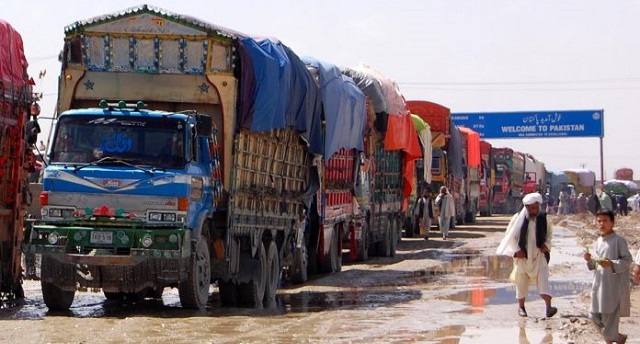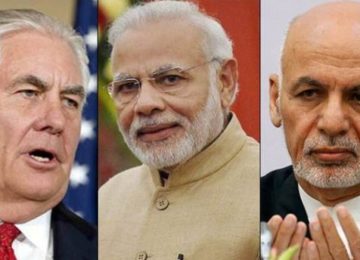June 22, 2020
Pakistan’s Foreign Office on June 20 announced to open its third border crossing terminal with Afghanistan – Ghulam Khan – with Torkham and Chaman border points already allowing transit and bilateral trade, to boost the trade volume between the two countries and facilitate landlocked Afghanistan. As per the decision, the new arrangement for trade will be in operation for six days a week while Saturday will be reserved for the movement of pedestrians between the two sides.
At a meeting held at Torkham between the border officials of Pakistan and Afghanistan last week, a decision was also made to allow 250 vehicles carrying Afghan import goods to enter Pakistan on a daily basis from June 22 while a similar number of vehicles carrying Pakistani export items would cross over into Afghanistan. On March 16, the bilateral trade between Pakistan and Afghanistan was temporarily stopped when Pakistan closed all its borders with Afghanistan to prevent the coronavirus transmission from across the border.
Under the new arrangement now, it was agreed that the drivers of both the countries would hand over their vehicles to their counterparts at the zero point for reloading into local vehicles. However, for any of the damage caused to the goods during the loading or reloading of the goods, neither of the governments would take any responsibility.
Speaking to the Center for Research and Security Studies (CRSS), Ahmad Shah Yarzada, Director, Afghan Chapter, Pakistan Afghanistan Joint Chamber of Commerce and Industry (PAJCCI), appreciated the decision to open Ghulam Khan terminals along with Torkham and Chaman crossing points. However, he affirmed that the decision had come too late after Afghan and Pakistani traders had suffered too heavy losses, amounting to billions of Pakistani rupees, due to the border closures in the last three months. Prior to the outbreak of COVID-19 pandemic, 500-600 trucks carrying transit and export cargo were crossing into Afghanistan via Torkham on a daily basis. Since Pakistan has opened the Torkham and Chaman crossing points on April 10, he said, only 11,000 trucks crossed the border, which exhibits the extreme drop in business between the two countries.
Yarzada further stated that, as Pakistan had closed the border with Afghanistan several times since 2017 mainly due to political differences with Kabul, most of the businessmen in Afghanistan had moved to use Bandar Abbas port of Iran for import of goods to Afghanistan. As a result, the trade volume between Pakistan and Afghanistan has dropped from US$2.5-3 billion in 2014 to now US $800 million. On the other hand, Afghanistan’s trade volume with Iran in 2014 was US $500 million while now it has increased to US $2.1 billion. The reason for this decline in trade volume between Pakistan and Afghanistan, Yarzada stated, was trust deficit. He went on to state that Afghan traders do not find Karachi ports safe for business anymore as, in his view, Pakistan is using them as a tool for political purposes. Furthermore, Yarzada maintained that the Federal Board of Revenue (FBR) of Pakistan is using delay tactics to make transit business suffer losses which is a serious violation of Afghanistan Pakistan Transit Trade Agreement (APTTA).
Speaking on the limit put on the number of trucks to cross over at 250, Yarzada stated that from a business point of view, it is not good to fix the number of trucks to cross to Afghanistan or Pakistan. For trade volume to actually be boosted, the number of trucks should be fixed to at least 1000 per day. Furthermore, he stated that there is no clause in APTTA which supports the idea of customs to subject transit cargo to 100% scanning.
He also stated that APTTA does not support any installation of tracking devices on transit cargo containers. However, the Customs in Karachi does not allow the movement of transit cargo from Karachi ports without installation of the tracker devices. For each single container, the Afghan importers pay 7,000 PKR as the fee for the tracker device. Currently, there are no more tracker devices available with the suppliers in Karachi which is not the Afghan importers’ fault. As a result, the cargo is stuck at the Karachi port and continuing to face heavy demurrage and detention charges.
In terms of the losses incurred to Afghan traders, Yarzada stated that the 8000 Afghan transit cargo containers stranded at Karachi ports for 90 days were exposed to detention charges of US $100 per container per day which amounts to US $72 million for just detention charges of the containers. Furthermore, the demurrage charges for the 8000 containers were Rs. 5000 per day which amounts to PKR 360 million for the 8000 containers for 90 days. Keeping in view these heavy losses, Yarzada asked whether the private sector would now trust Karachi ports in the future? Keeping in view all these factors, he affirmed, that now the Afghan business community was inclining towards using Iranian ports for imports into Afghanistan.
PAJCCI’s Senior Vice President from Pakistan, Ziau-ul-Haq Sarhadi, while speaking to CRSS, stated that the trade volume between Pakistan and Afghanistan had certainly dropped immensely since the outbreak of COVID-19. Regarding the latest decision to hand over the trucks to local drivers on the other side of the border, Sarhadi stated that the arrangement was inconvenient and even unacceptable for the traders who would not want to hand over the control of their millions’ worth of goods to the driver of the other country with neither government taking any responsibility in case of any damage or loss.
He further stated that such decisions made by the bureaucrats in closed doors do not take into account the ground realities faced by traders on both sides which is hurdling the smooth flow of transit and bilateral trade. He urged the government to come up with an arrangement which is more convenient and feasible, such as checking the temperature of the driver of the trucks before he enters into the country so as to check whether he is showing any symptoms of coronavirus or not. He stated that such procedures are followed for the passengers that come from other countries. He also stated that for a robust flow of trade between the two countries, the numbers of trucks carrying goods should not be fixed but be allowed to be at maximum for the trade volume to actually increase.
This report is compiled by Sitwat Waqar Bokhari who is the Program Manager for ASC and Research Fellow at CRSS.








